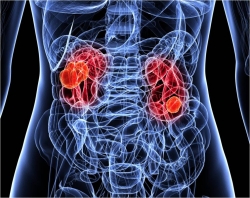|

Join our mission to the discovery of new endourologic cures and treatments, click on any of the following links to see our open clinical trials.
You can also view all Clinical Research Trials here
Fast Facts
NCI Protocol # UAZ20-01-01
Clinical Study of Bioactivity of Low Dose Apalutamide in Prostate Cancer Patients Scheduled for Prostatectomy
Study Information:
- A new prostate cancer research study is being conducted at the University and sponsored by the National Cancer Institute.
- The study is recruiting men diagnosed with prostate cancer and scheduled for removal of the prostate gland.
- The purpose is to determine whether apalutamide will lead to lowered PSA levels in men with prostate cancer confined to the prostate gland.
- Apalutamide is an FDA approved oral medication used to treat prostate cancer patients with advanced stages of the disease.
- The study will use low doses of apalutamide (one-quarter or less than the dose used in patients with advanced stages of prostate cancer).
- This study may help researchers learn more about how apalutamide works in the body and how it may be used to help prevent prostate cancer from worsening.
Study Involvement:
- Come to a study clinic to undergo a screening process to determine eligibility for study participation - brief physical exam, review of medical history and current medications, blood tests, study questionnaires
- Once determined eligible, take Apalutamide as prescribed until the day of the scheduled prostate surgery.
- Weekly communication with the study staff
- Return to the study clinic within 3 days before surgery - brief physical exam, additional blood tests, study questionnaires
- Final study visit 7-14 days after the prostate surgery for additional blood tests - may be combined with the post-op appointment.
Subject Compensation:
Qualified participants receive apalutamide and study evaluations at no cost and up to $300 for participation
Study Coordinator:
Frances Epstein, 520-471-7867 fminter@arizona.edu
Primary Objective:
To determine the effects of low dose apalutamide on circulating levels of Prostate Specific Antigen (PSA).
Secondary Objectives:
- Reversibility of testosterone levels 7-14 days post intervention
- Post-intervention plasma trough apalutamide concentration
- Intra-prostatic immune cell infiltration
- Health-related quality of life
- Gleason score of pre- and post-intervention tumor(s) with matched location
Inclusion Criteria
- Men over the age of 18 with histologically confirmed organ-confined adenocarcinoma of the prostate (PCa) suitable for prostatectomy.
- Gleason score ≤ (4+4).
- Current serum PSA < 10 ng/ml OR PSA ≥ 10 ng/ml with PSA density < 0.3ng/ml2.
- Karnofsky ≥70%.
- Participants must have normal organ and marrow function.
- TSH within the institutional normal range.
- Willing to use adequate contraception for the duration of study participation and for 3 months following the last dose of study drug; must also agree not to donate sperm during the study and for 3 months after receiving the last dose of study drug.
- Ability to understand and the willingness to sign a written informed consent document.
Exclusion Criteria
- Prior or ongoing hormonal treatment for prostate cancer.
- Patients who have prostate cancer with distant metastases.
- Presence of neuroendocrine differentiation in the prostate biopsies.
- Serum testosterone (blood collected between 7-10 AM) < 200 ng/dL.
- Have a history of prior malignancies other than prostate cancer within the past 2 years, excluding non-melanoma skin cancer.
- Severe or unstable angina, myocardial infarction, symptomatic congestive heart failure, arterial or venous thromboembolic events or clinically significant ventricular arrhythmias within 6 months prior to registration.
- History of seizure or known condition that may pre-dispose to seizure.
- Use of drugs known to lower the seizure threshold.
- Concurrent use of drugs in category X.
- Participants may not be receiving any other investigational agents.
- History of allergic reactions attributed to compounds of similar chemical composition of apalutamide
- Uncontrolled intermittent illnesses or medical conditions.
|


